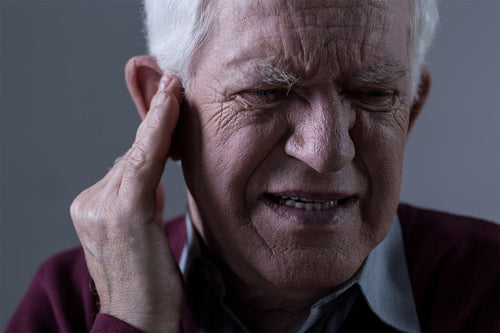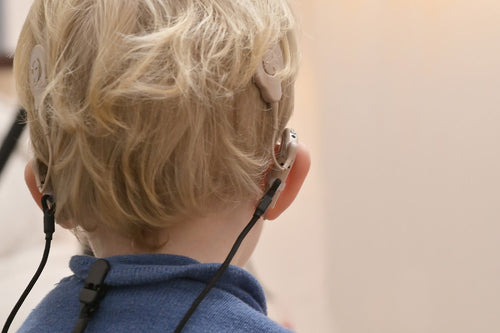“Aside from the benefits of new technology, earbuds can pose certain risks. The most obvious is making sure to control a safe volume to avoid loud noise exposure. Second, the ear canal is highly sensitive and earbuds can exacerbate problems with earwax and ear canal skin. Lastly, and perhaps most importantly, noise-canceling earbuds can isolate the user who has to be especially careful of his environment. In a sense, the earbud user becomes deaf to the outside world, listening only to what is present from the earbuds. While this seems awesome, it can also place the person at risk of inattention and even bodily harm.” - Drew Sutton, MD, Board-Certified Otolaryngologist
If you commute in any large city on public transport or are even just walking around, chances are you will find many teens, young adults, or adults with headphones and earbuds. Headphones are a daily essential for many people.
Going to the gym, working from home, or simply wanting to jam out to some tunes are just a few of the ways headphones are an essential everyday carry for many people.
While headphones and earbuds can be a great way to enjoy all of your digital media on the go, it is important to understand the limitations of headphones and what you should be on the lookout for when it comes to listening safely and ensuring the health of your hearing comes first.
Below is a closer look at the pros and cons of earbuds and how these factors contribute to the overall relationship between headphones and hearing health. Understanding how headphones can affect your hearing health can make sure that you utilize them in a manner that maximizes usability without sacrificing health.
Pros of Earbuds
Earbuds have taken off in popularity in the past few decades. The Walkman introduced the on-the-go private listening experience, and since its release, headphone usage has become a mainstay in modern society.
From their small form factor to turning otherwise boring situations into immersive ones, headphones have a tremendous number of pros, and below is a closer look at some of those pros.
Portability
Earbuds today are far less clunky than they used to be, and they now have the convenience to be tossed in your bag or pocket on the way out the door. For many people, portability entices them to carry headphones as an everyday carry alongside their keys and wallet. As technology continues further, this portability is likely to get even better.
Hearing aids, a close cousin to the earbud, are an example of just how small these devices have been able to go. Audien’s EV3 is 26 percent smaller than its predecessor, the EV1, already much smaller than traditional hearing aids. The EV3 is smaller while simultaneously bringing new features such as enhanced comfort and Clear Sound +.
Audio Entertainment
The podcasting and audio-based entertainment industry have boomed in recent years. This boom has contributed mainly to the fact that people today are pretty busy, and listening to their favorite show, movie, or book allows them to take on other tasks simultaneously.
Earbuds allow these individuals to enjoy their favorite talk shows or books while doing an array of tasks. Doing the laundry, taking the dog out, commuting to work, and even waiting in a waiting room are now spaces where individuals can consume entertainment privately and without interfering with their abilities to perform a given task.
Cons of Earbuds
While earbuds have quickly become the trusty companions of many, there are some key cons to constantly having earbuds in your ears. Constant exposure to loud sounds, being unable to hear your surroundings, and a lack of breathability for the ears are some of the main cons of earbuds.
Block the Ear Canal
The ear is made up of three parts and includes the inner, middle, and outer ear. When you put earbuds in, you block the ear canal, which is part of the outer ear. This seal created by earbuds allows them to shield out external noise, but it can also be problematic when left in for hours.
The outer ear is constantly secreting a substance called cerumen. Cerumen is better known as earwax, but it plays an essential role in helping to keep the ear canal moisturized, helps to remove dead skin cells from the canal, and acts as a defense against foreign objects entering deep into the ear. The cerumen production is constant, but the ear is self-cleaning and can expel earwax regularly without assistance.
The self-cleaning properties of the ear are the main reason medical professionals advise against utilizing cotton swabs to clean out the ear canal as it is unnecessary and could lead to an individual injuring their eardrums.
Earbuds effectively seal the outer ear, and as a result, a build-up of moisture and cerumen can occur. This issue is further exacerbated by individuals wearing headphones at all hours of the day as it doesn’t allow the ears to effectively “breathe” and try to expel the cerumen.
When a build-up of earwax occurs, it can result in a condition known as earwax impaction or blockage, where essentially cerumen builds up enough to block off part of the ear canal completely.
Earwax impaction can cause several concerns, including hearing loss in some situations. When wax build-up is blocking the canal, it also blocks the sound waves from reaching the eardrum, which can decrease your auditory acuity. Luckily earwax impaction is easily diagnosed with a simple visual exam, and hearing loss will typically be resolved once the blockage is removed.
Ear infections could also occur if there is fluid build-up in the middle ear, which can become infected with bacteria. If you're worried about hearing loss, some warning signs to look out for include ringing, buzzing, ear sensitivity, and muffled noises.
Could Cause Damage
Another more serious con of earbuds is that they can cause permanent hearing loss if misused. Earbuds typically have smaller drivers and speakers when compared to over-the-ear headphones, but the fact that they are sealed with the ear canal and are in closer proximity to the eardrum means that they still can cause hearing damage.
Earbuds have the potential to cause damage because of the high volumes they can reach. Many people don’t think that the headphone volume level can be too high and just assume the products they buy are safe. Sound levels below 70dBA are generally considered safe, and most earbuds are capable of sound levels well over this generally safe range.
It is well documented that prolonged sound levels of 85dB and short-term exposure to sound levels over 90db are more likely to lead to temporary hearing loss. Many headphones available today have an upper range of volume that can reach 100 decibels (dB) or more. Because of this, it is up to you to listen responsibly and make sure you don’t crank the volume all the way up.
Many devices like smartphones now come with features to ensure a safe listening experience by limiting the volume level that headphones can reach, but this setting typically requires you to set up and is not standard.
Unlike an ear blockage, hearing damage from loud and sustained headphone use can be permanent with no real solution. This illustrates the importance of understanding headphone safety and hearing loss prevention.
You'll want to avoid turning the volume anywhere near maximum volume, avoid listening to loud music, go to concerts (like a rock concert) without proper protection (earplugs), and avoid going places with loud background noise. If you use earbuds or noise-canceling headphones, try to be mindful of the volume limit and the amount of time you spend using them. While noise cancellation can be great, make sure you listen to music at a safe volume.
By practicing safe listening and being mindful of your headphone usage and noise levels, you can decrease your risk of hearing loss. Loud volume should be avoided at all costs.
How Headphones Can Damage the Ear

Headphones can damage your ears in a similar way to other environmental noise-induced hearing loss. Occupational noise exposure has historically been one of the leaders in noise-induced hearing loss incidents. Workers on a job site and other loud environment careers force individuals into areas where loud noises are constant.
For these workers, there are now regulatory guidelines that require workers to have hearing protection. While workplaces are getting their act together when it comes to preserving hearing health, the tech industry is providing products that have the potential to cause lasting damage. With the increasing popularity of headphones, they may soon become the new leader in noise-induced hearing loss incidents.
When people think of headphones, they typically don’t think of them being as loud as a jackhammer, but in reality, a set of headphones can cause lasting damage due to their proximity to the ears. Headphones cause damage to the inner ear, and typically, this damage is to the cochlea.
The cochlea is the snail-shaped auditory organ that is responsible for converting the sounds you hear into nerve impulses. Loud noises can damage the cochlea’s inner hairs, which are responsible for sensing different pitches of noise. The hairs detect certain sound frequencies by bending, and loudness is perceived by the intensity of the wave that causes the hairs to bend.
Prolonged exposure to loud sounds damages these hairs and can permanently damage the hair where it is unable to perceive sounds as well.
Conclusion
In summary, headphones are a great everyday essential that allows you to listen to whatever you want when you want. While their small size and ease of use are nice to have, it is important to note that they can cause hearing problems if not used responsibly.
Both conductive and sensorineural hearing loss can be induced due to poor headphone practices. Keeping headphones in your ears too long and having the volume too high is detrimental to your ear health and may lead you toward losing your hearing.
If you suspect that you are experiencing signs of hearing loss, visit an audiologist to get evaluated.
If you are like most kids growing up, you may have inadvertently damaged your hearing as headphones and listening safety was not as pervasive as they are today. If you suspect you have lost some auditory acuity, you should get a hearing test. If you have mild-moderate hearing loss, hearing aids may be a good option to allow you to hear more.
Audien’s discrete and small form factor can allow you to regain your ability to hear others without feeling self-conscious about having a hearing aid.
Sources:
Too Loud. Too Long. | Noisy Planet | NIH




